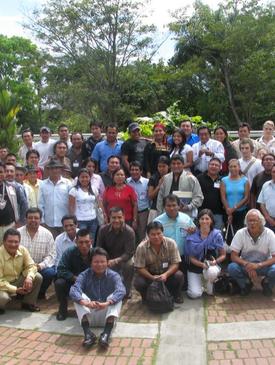First Informational Workshop on REDD for Panamanian Indigenous Leaders
Summary
The key role of forests in climate change mitigation was finally recognized in Bali in 2007. Since then, REDD demonstration activities have been encouraged and implemented in several developing countries, and there has been increasing enthusiasm about its potential contibutions to both mitigation and conservation. However, the International Forum of Indigenous People on Climate Change (IFIPCC) has expressed concerns about REDD's potential to threaten indigenous culture and livelihoods. This series of workshops was developed in order to help Panama's indigenous leaders to better undersatand REDD, with its potential benefits and risks, so that they can make an informed decision as to whether or not they want to participate in such activities.
Content
Module 1. Introduction to climate change
- General introduction to the theme of climate change at a global scale, followed by an introduction to climate change issues in the context of Panama.
Module 2. Introduction to REDD
- Background on climate change and introduction to REDD, followed by an open discussion about how REDD projects might impact indigenous communities. Presentation of Panama’s Proposed National REDD Strategy.
Module 3. Carbon, carbon markets, and REDD
- Introduction to the role of carbon in global warming, the evolution of the carbon market and risks involved with the implementation of REDD.
Module 4. Indigenous experiences with REDD and carbon forestry projects in Latin America
- Basic understanding of experiences other indigenous communities in Latin America are having with REDD and carbon forestry projects. Case studies:
- Experiences in Panama with the Ipetí-Emberá indigenous community and carbon forestry projects (i.e., selling carbon credits via reforestation)
- The REDD indigenous program in the Bolivian Amazon (the Confederation of Indigenous Communities - CIDOB)
- The “Socio Bosque” program in Ecuador (government project)
- The carbon forestry project in Pico Bonito National Park, Honduras, run by EcoLogic (Bosques Pico Bonito)


